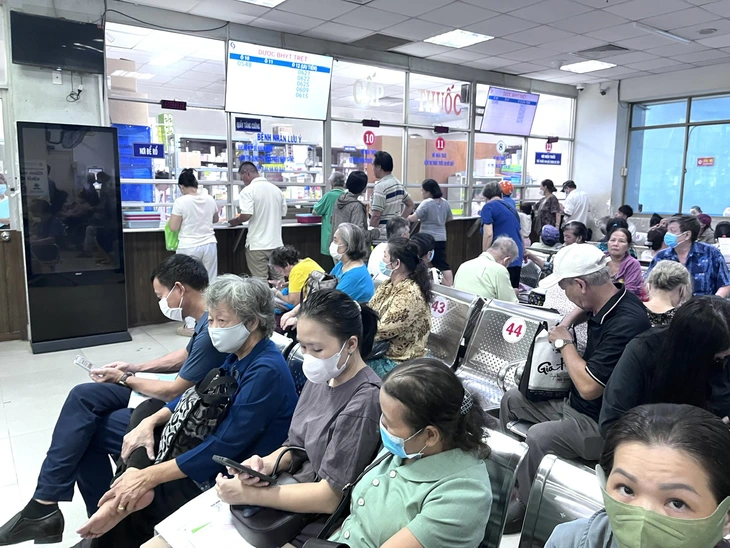
Patients wait to receive health insurance medicine at a hospital in Ho Chi Minh City - Photo: THUY DUONG
Immediately after posting the article: "Prescribing medicine 2-3 times/month: Many chronic patients say they are only given the same medicine as before", Tuoi Tre Online has received a lot of feedback from readers.
Many readers believe that the reason why many chronic patients are only given medication for 28 days as before is because if doctors prescribe medication for 2-3 months at a time for many patients, hospitals will lose revenue and reduce their income.
Prescribe 28 days of medication to collect patient visit fee?
A reader with email manh****@gmail.com said: "Providing medicine like that will reduce the hospital's income, because patients who come here cannot be examined. The doctor only asks a few questions and then gives the medicine, but still loses money."
Agreeing, reader lehu****@gmail.com wrote: "Even at private hospitals, each time you go for a health insurance check-up, you will incur an additional charge of nearly 200,000 VND. If you prescribe medicine for 2-3 months at a time, the hospital will lose revenue."
According to reader Tung Thanh's analysis, "the most basic reason why hospitals or doctors do not prescribe medicine every 3 months is because they are afraid of reducing the hospital's income. If they come once a month, they charge a fee for each visit. Now, they only come once every 3 months, so they have to pay for the medical examination twice."
"The regulations are in place, but whether hospitals enforce them or not is another matter. Patients are upset, but how can they tell doctors and pharmacists?" reader Quang Bang asked.
Before the heated discussion on this issue, reader Huc Nguyen told his own story: "I have high blood pressure and chronic kidney failure. I have been treated for many years now and have been given the same 28-day prescription every month.
I asked the doctor if according to the new regulations, he could give me 2 months of medicine. The doctor replied that 2-3 months of medicine was only in the newspaper.
"Since the Ministry of Health asked for comments on the draft guidelines on providing medicine for more than 30 days for chronic patients, I think it might be difficult to implement. The reason is not due to the disease, the root cause is that the health insurance revenue from patients is a huge amount of money for hospitals.
If the medicine is provided for 90 days, the hospital loses twice the health insurance money because the patient does not go to the doctor. If it is provided for 60 days, they lose once. So losing thousands of visits each month means losing a lot of money...", reader Le Tung expressed his opinion.
According to a reader with email ngan****@gmail.com: "There are regulations that prescribe medicine for 90 days for patients. If there are complications, they can come for an emergency check-up without waiting for a deadline, so there's no need to explain anything. Anyone who has gone to the doctor knows that the medicine is almost the same every month."
"I recently went for a check-up at a hospital. Through direct discussion with the doctor, I understood that there was some secret reason why the hospital did not want to change the time to provide longer-term medication. Even when I went for a check-up, they only measured my blood pressure and gave me the same medication as the old prescription," reader Tieu Tuyet questioned.
Many readers said that their chronic illness had stabilized, but when they went to the hospital for examination, many doctors said they had not received information about the doctor prescribing medication every 2-3 months.
The reason is that it has not been implemented yet due to the mechanism (?). Many doctors also said that the issuance of 2-3 month prescriptions for people with stable chronic diseases "only appears in the newspapers...".
However, some readers like Ngoc An have pointed out the difficulties of doctors. "If the above diseases unfortunately develop complications within 2-3 months, will the patient blame the doctor? When prescribing medicine for 2-3 months, the doctor still has to rely on the health condition and age of each patient to decide. Don't think that the doctor is afraid of not having enough money for monthly check-ups so he doesn't dare to prescribe medicine."
The Ministry of Health checks the implementation, do not let "drums beat one way, trumpets blow the other"
Discussing solutions to implement the above regulation, reader with phone number 0916******11 suggested: "Maybe doctors have not prescribed 2-3 months of medication for many patients, but is it okay to prescribe 6 weeks of medication?".
"I think the 2-3 month supply of medicine should be automatically sent to the home after the short-term prescription. After that period, the patient should go see the doctor to get a new prescription," reader Linh suggested.
Reader Do Duc Hieu agreed: "Because the diseases that use drugs to treat chronic diseases are often stable. During the outpatient treatment period, if there are any unusual symptoms, the patient should come to the doctor immediately. I am also a doctor in the industry, I understand."
Similarly, reader Hanh Le told her own story of going to the doctor and proposed a solution to the health sector: "On July 9, I went to the hospital to get a medical examination and get health insurance medicine. The number of patients was still as high as usual. The prescription for blood pressure and joint pain was still the same as usual for 21 days. When I asked the doctor, I was told that there were still many responsibilities involved. The health sector should have specific instructions and guidance."
According to reader Dam Chi Cuong, "the authorities really need to inspect and directly monitor how all hospitals are performing during this time, only then can we hope for real change. We, the people, are looking forward to it."
"The Ministry of Health needs to inspect the implementation of hospitals to assess problems and difficulties, and at the same time provide specific instructions for synchronous implementation. Do not let the drum beat in one direction and the trumpet blow in the other," reader Vo Ky suggested.
Source: https://tuoitre.vn/khong-ke-don-thuoc-2-3-thang-lan-co-ly-do-nao-an-giau-sau-toa-thuoc-28-ngay-20250714180234249.htm


![[Photo] 60th Anniversary of the Founding of the Vietnam Association of Photographic Artists](/_next/image?url=https%3A%2F%2Fvphoto.vietnam.vn%2Fthumb%2F1200x675%2Fvietnam%2Fresource%2FIMAGE%2F2025%2F12%2F05%2F1764935864512_a1-bnd-0841-9740-jpg.webp&w=3840&q=75)


![[Photo] Cat Ba - Green island paradise](/_next/image?url=https%3A%2F%2Fvphoto.vietnam.vn%2Fthumb%2F1200x675%2Fvietnam%2Fresource%2FIMAGE%2F2025%2F12%2F04%2F1764821844074_ndo_br_1-dcbthienduongxanh638-jpg.webp&w=3840&q=75)





































































































Comment (0)